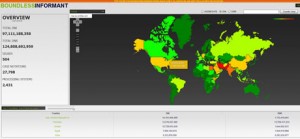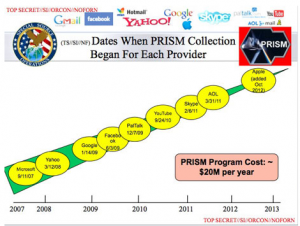On March 23, 2004 at noon, less than two weeks after the dramatic hospital confrontation and threats to quit reportedly got the Administration to agree to stop data mining Americans, FBI Director Robert Mueller had a meeting with Dick Cheney, at the Vice President’s request, in the Vice President’s office. In his notes, Mueller doesn’t describe what the VIce President wanted, nor am I aware that it has even been reported in the press.
The next day, the Chief Division Counsel of some Division of the FBI wrote a memo to the FBI General Counsel noting that FBI was using a “new standard” with Section 215 of the PATRIOT Act and indicating that a “recent decision” had been made to bypass the review of the Office of Intelligence Policy and Review on Section 215 applications.
In part, the apparent decision to bypass OIPR, which had rejected the premise of the previous Section 215 orders FBI had submitted in the past, reflected no more than a concerted effort on FBI’s part to make sure it could start using all the PATRIOT authorities it had been granted in 2001 in anticipation of renewal discussions that would take place the following year. Yet the timing of this change is particularly curious, given that we now know Section 215 has been used to collect data that could be used for data mining Americans, precisely the problem that had caused the hospital confrontation 12 days earlier.
At the very least, however, it shows that sometime around the same time as Jim Comey and others at DOJ tried to stop the data mining of Americans under NSA’s illegal program, FBI claimed to have eliminated one review step for Section 215 orders and changed the standard used for them. That reference notwithstanding, DOJ Inspector General at least reported that OIPR continued to have a role. (Note, the office that got cut out of the process, OIPR, is where one of the key whistleblowers on the illegal program, Thomas Tamm worked, though I have asked him if he knew whether they used Section 215 to accomplish the same program and he didn’t know anything about it.)
On May 21, 2004, just as the the confrontation was settling down, FBI got its first Section 215 order approved. MIRACLES! the memo subject line read. “We got our first business record order signed today. It only took two and a half years.”
Now, at least some of the people commenting publicly on the confirmation that Section 215 has been used to compile a database recording details on all calls Americans make say Section 215 has supported that purpose only since 2006. Dianne Feinstein, for example, says the practice has gone on for 7 years.
As far as I know, this is the exact three month renewal of what has been the case for the past seven years. This renewal is carried out by the FISA Court under the business records section of the Patriot Act. Therefore, it is lawful.
Seven years would put its start almost exactly at the March 9, 2006 renewal of the PATRIOT Act, which added new language on Section 215 in the wake of the December 15, 2005 exposure of Bush’s illegal wiretap program. In discussions of this collection program since last week, it has generally been accepted that’s when it all started.
Curiously (particularly given his insistence that PRISM only started in 2008, slides to the contrary notwithstanding), James Clapper made no claims about precisely when this practice started.
The Patriot Act was signed into law in October 2001 and included authority to compel production of business records and other tangible things relevant to an authorized national security investigation with the approval of the FISC. This provision has subsequently been reauthorized over the course of two Administrations – in 2006 and in 2011. It has been an important investigative tool that has been used over the course of two Administrations, with the authorization and oversight of the FISC and the Congress.
It is possible that this program was conducted under a different PATRIOT provision (such as the Pen Register ones) prior to 2006; in fact, Clapper never mentions the term “Section 215” in his purported clarification of the program.
Now, consider one more detail. In a statement before the 2009 debate on PATRIOT Act reauthorization focusing closely on Section 215, Russ Feingold suggested that the debate over reauthorization in 2005, which led to purported initial use of Section 215 to conduct this dragnet, had been stymied by classification of how the PATRIOT had been implemented.
I remain concerned that critical information about the implementation of the Patriot Act has not been made public – information that I believe would have a significant impact on the debate. During the debate on the Protect America Act and the FISA Amendments Acts in 2007 and 2008, critical legal and factual information remained unknown to the public and to most members of Congress – information that was certainly relevant to the debate and might even have made a difference in votes. And during the last Patriot Act reauthorization debate in 2005, a great deal of implementation information remained classified.
[snip]
But there also is information about the use of Section 215 orders that I believe Congress and the American people deserve to know. I do not underestimate the importance of protecting our national security secrets. But before we decide whether and in what form to extend these authorities, Congress and the American people deserve to know at least basic information about how they have been used. So I hope that the administration will consider seriously making public some additional basic information, particularly with respect to the use of Section 215 orders.
There can be no question that statutory changes to our surveillance laws are necessary. Since the Patriot Act was first passed in 2001, we have learned important lessons, and perhaps the most important of all is that Congress cannot grant the government overly broad authorities and just keep its fingers crossed that they won’t be misused, or interpreted by aggressive executive branch lawyers in as broad a way as possible. [my emphasis]
This suggests the plan to use Section 215 may have been explicit in those classified debates.
Read more →



